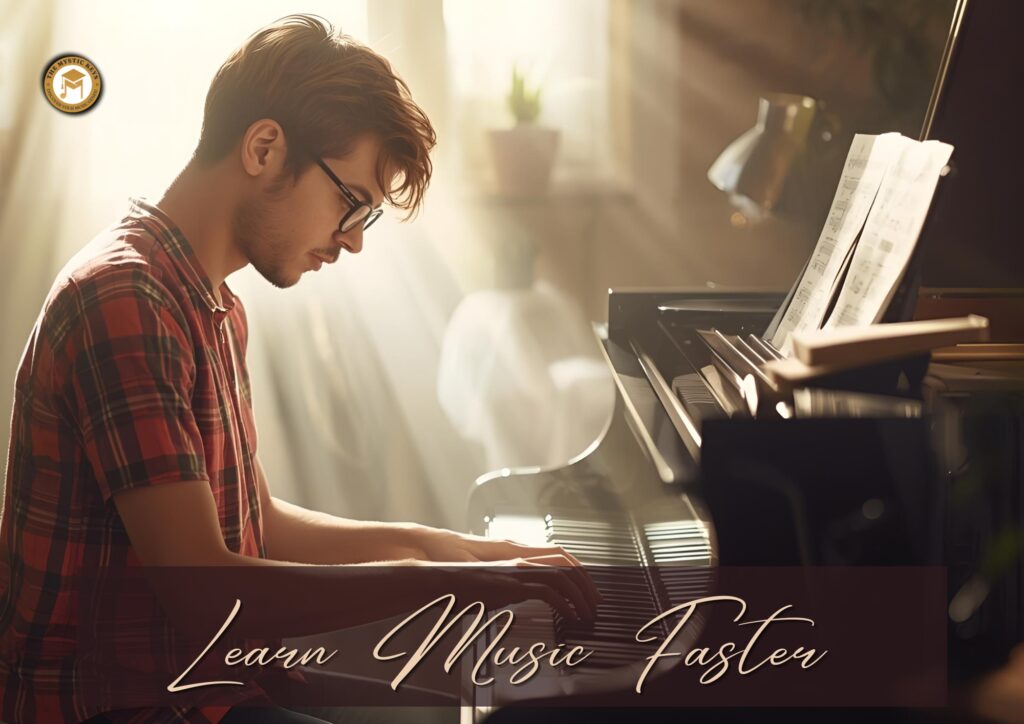Learn Music Faster | Simple Tricks That Actually Work
Learning music can often feel like a slow and overwhelming journey. Many beginners start with excitement and high hopes, imagining themselves effortlessly playing their favorite songs. But reality quickly sets in when progress feels sluggish, and mastering even simple pieces seems challenging. Intermediate players face their own struggles, hitting plateaus where improvement stalls despite consistent practice. These obstacles can be discouraging, making the journey seem longer and more difficult than it truly is. Yet, the process of learning music doesn’t have to be this frustrating or slow. By applying the right mindset, structured strategies, and smart practice techniques, you can learn music faster and enjoy a smoother, more rewarding musical journey.
The key lies in understanding how you learn, setting achievable goals, and practicing in ways that maximize both efficiency and retention. By combining focused practice with mental techniques, technology, and a bit of ear training, you can unlock faster progress without sacrificing quality. This isn’t about rushing through the process—it’s about learning smarter, noticing improvement more quickly, and maintaining your enthusiasm along the way. In the sections that follow, we’ll explore practical, simple tricks that really work, helping you develop your skills faster, stay motivated, and enjoy every step of your musical growth.

Learn Music Faster by Understanding How You Learn
Before you even touch an instrument or open a music book, it’s essential to understand your learning style. How you absorb information will affect how fast you progress.
Visual Learners thrive with charts, sheet music, and video tutorials. Seeing patterns helps your brain remember them.
Auditory Learners excel when listening to music, recordings, or vocal instructions. Hearing the music repeatedly helps you internalize rhythm, melody, and tone.
Kinesthetic Learners need hands-on experience. Playing, moving, and experimenting with instruments solidify understanding.
Once you know your learning style, you can structure your practice in a way that maximizes retention and enjoyment, creating a foundation for faster progress.

Set Clear Goals to Learn Music Faster
Without a roadmap, learning music can quickly feel aimless, leaving you unsure of what to practice or how to measure progress. That’s why setting clear, achievable goals is essential—it provides direction and fuels motivation.
Instead of vague objectives like “I want to play the guitar,” focus on specific, measurable targets that give your practice purpose. For example:
“I want to play ‘Twinkle Twinkle Little Star’ with both hands in a week.”
“I want to master three basic chord progressions this month.”
Breaking larger goals into smaller, manageable milestones transforms an overwhelming journey into a series of attainable steps. Each small success not only builds your skills but also reinforces motivation and confidence, keeping you energized and consistent in your musical growth.

Practice Smart, Not Just Hard
Many learners believe that practicing for hours guarantees rapid progress. In reality, quality beats quantity. Focused, intentional practice accelerates improvement more than mindless repetition.
Short, Frequent Sessions: 20–30 minutes multiple times a day is better than a long, exhausting session once a week.
Slow Practice: Accuracy first, speed later. Playing fast too soon builds mistakes into muscle memory.
Segmented Practice: Divide a piece into sections and master them individually before combining.
Smart practice reduces frustration and ensures that your effort is effective, saving time while improving skill.
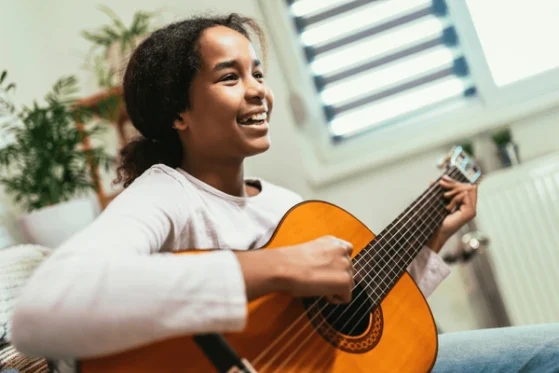
Learn Music Faster with Visualization Techniques
Visualization is a surprisingly powerful tool. Even without your instrument, mental practice can strengthen memory and understanding.
Mental Rehearsal: Picture yourself playing a piece, imagining every finger movement and hearing the notes.
Score Reading in Your Mind: Visualize sheet music or chord charts, connecting notes to finger positions.
Auditory Imagery: Hear the melody internally as you go through a piece mentally.
Professional musicians often use visualization to prepare for performances. Studies show that mental practice alone can improve performance nearly as much as physical practice.

Gradually Learn Music Theory
Music theory doesn’t have to be intimidating. Understanding how music works can dramatically speed up learning.
Recognize patterns in scales, chords, and chord progressions.
Improve improvisation and composition skills.
Sight-read music more easily.
Start with essentials: major and minor scales, basic chords, and rhythm patterns. Once these basics are clear, every new song you encounter will feel more approachable, making learning faster and less frustrating.
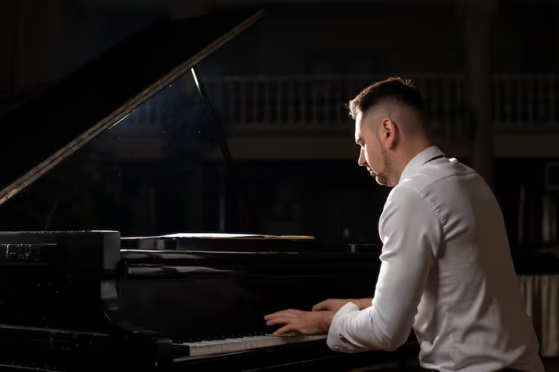
Record Yourself to Learn Music Faster
Recording your practice sessions is one of the most effective yet underrated tools for learning faster.
Identify mistakes you might not notice while playing.
Track progress over time, keeping you motivated.
Develop a critical ear to improve musicality and tone.
Listening back objectively helps you refine skills faster than practice alone. You’ll start noticing patterns in your mistakes and correct them before they become habits.
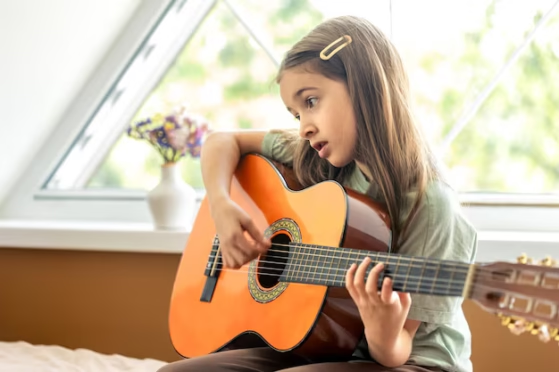
Learn Music Faster Using Technology
In today’s digital world, technology can accelerate music learning like never before.
Metronome Apps: Improve rhythm and timing.
Tuner Apps: Ensure your instrument is always in tune.
Online Courses and Tutorials: Structured lessons guide your learning efficiently.
By combining traditional practice with digital tools, you create a hybrid learning environment that is effective, interactive, and fun.

Train Your Ear
A good musical ear is crucial for faster learning. If you can identify notes, chords, and intervals by ear, your learning curve shortens dramatically.
Learn to play songs by listening, without relying entirely on sheet music.
Improve improvisation and composition skills.
Develop a deeper understanding of music theory in practice.
Start with simple exercises: identify notes, play back melodies by ear, and recognize chord changes. With time, ear training makes learning new pieces more intuitive.

Repetition with Purpose
Repetition is the key to mastery, but only if done intentionally. Mindless repetition reinforces mistakes, slowing progress.
Focus on challenging sections first.
Repeat slowly and correctly before speeding up.
Gradually increase complexity once mastery is achieved.
Intentional repetition strengthens muscle memory and allows your brain to retain information more effectively, accelerating your learning journey.
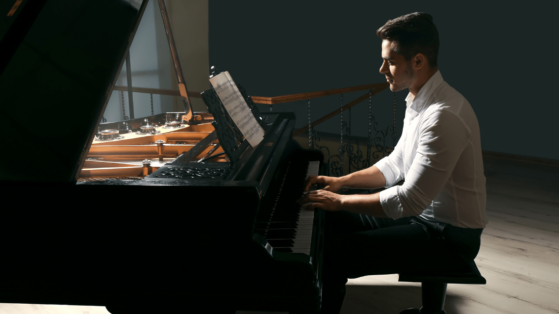
Consistency and Patience
Fast learning is not about skipping steps; it’s about consistency. Daily, even brief practice sessions are more effective than occasional long sessions.
Keep track of daily progress to stay motivated.
Understand that improvement is gradual; patience ensures long-term growth.
Every small step adds up. Consistent effort creates lasting skills and makes complex pieces approachable over time.

Join a Community or Find Guidance
Learning in isolation can slow progress. Guidance and social interaction enhance speed and understanding.
Join music communities or online forums for support and inspiration.
Take lessons from skilled instructors who provide structured guidance.
Collaborate with peers to gain new perspectives and techniques.
Feedback and social support shorten the learning curve by keeping you accountable and motivated.

Keep the Joy Alive
Above all, learning music should be an enjoyable experience. Passion is a powerful accelerator because when your brain associates effort with enjoyment, learning becomes much easier and more effective. One of the simplest ways to keep the spark alive is by including songs you genuinely love in your practice—this keeps you emotionally connected to your instrument and the music you play.
Equally important is to celebrate small achievements along the way. Even mastering a single chord, rhythm, or passage is progress, and acknowledging it reinforces motivation and confidence.
Additionally, exploring improvisation and creativity adds an element of fun and discovery to your sessions. Experimenting with your own variations or creating little melodies transforms practice from a routine into an engaging, imaginative activity.
When learning is enjoyable, motivation flows naturally, concentration deepens, and progress becomes almost effortless. By making music a source of joy rather than a task, you not only learn faster but also develop a lifelong love for your art.

Conclusion
Yes, you can learn music faster, but it’s not just about practicing harder—it requires a strategic approach. By first understanding your learning style, setting clear and achievable goals, practicing with intention, leveraging modern technology, and training your musical ear, you create a roadmap that guides your progress efficiently, without feeling overwhelmed or lost.
At The Mystic Keys, we believe that music is a journey, not a race. With patience, consistent effort, and a love for the art, improvement comes naturally, and every practice session becomes rewarding. By applying these techniques and learning with guidance from experienced instructors at The Mystic Keys, you’ll evolve from a hesitant beginner into a confident, skilled musician sooner than you ever imagined—while truly enjoying every note along the way.
For more information and exciting resources about learning music, visit our website at The Mystic Keys. For more music content and exciting offers follow us on
Facebook, Instagram, YouTube, LinkedIn, Twitter, Pinterest, and Threads.


